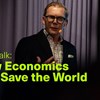satisfying
Continuity and catastrophic risk
Economics & Philosophy Abstract Suppose that a decision-maker’s aim, under certainty, is to maximize some continuous value, such as lifetime income or continuous social welfare. Can such a decision-
What calibrating variable-value population ethics suggests
Economics & Philosophy Abstract Variable-Value axiologies avoid Parfit’s Repugnant Conclusion while satisfying some weak instances of the Mere Addition principle. We apply calibration methods to two

How economics can save the world
Book launch for How Economics Can Save the World (Penguin, 2023) by Erik Angner, professor of practical philosophy and PhD in economics. Economics has always been shadowed by a movement that has been c
Restricted completion of sparse partial Latin squares.
Combinatorics, Probability and Computing, 1-21. doi:10.1017/S096354831800055X, Cambridge University Press. Abstract An n × n partial Latin square P is called α-dense if each row and column has at most αnnon-emp times in . An × array where each cell contains a subset of {1,…, } is a (, ) -array if each symbol occurs at most times in each row and column and each cell contains a set of size at most . Combining the notions of completing partial Latin squares and avoiding arrays, we prove that there are constants , > 0 such that, for every positive integer , if is an -dense × partial Latin square, is an × -array, and no cell of contains a symbol that appears in the corresponding cell of , then there is a completion of that avoids ; that is, there is a Latin square that agrees with on every non-empty cell of , and, for each , satisfying 1 ≤ , ≤ , the symbol in position (, ) in does not appear in the corresponding cell of .
Beyond Operation Protective Edge
The most recent conflict in Gaza – Operation Protective Edge – brought to the fore crucially important debates in both international law and the ethics of war. In November this year, a group of intern
Book talk: How Economics Can Save the World
Economics has always been shadowed by a movement called "anti-economics", denouncing its practitioners, attacking its assumptions, rejecting its conclusions, and protesting its influence. In his book H
Fernando Filgueira: Latin America`s left shift: why, what it did, for how long and what comes after.
Fernando Filgueira, Senior researcher at CIPPEC (Argentina) and CIESU (Uruguay), and lead author for the UN-Women Gender Progress Report for Latin America and the Caribbean. ABSTRACT As countries in Lat








